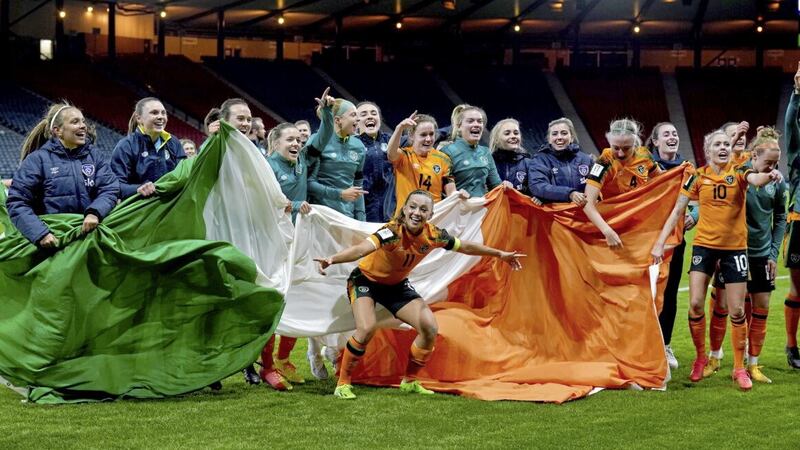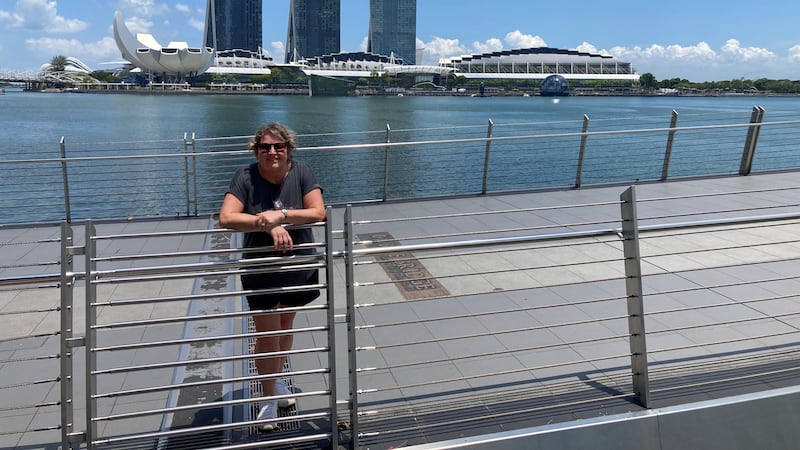UNLESS you've been living under a rock or completely off radar this last while, you'll know that singing the words "Ooh ah, up the Ra" in public brings with it an awful lot of controversy.
It's well covered in the media. From the young people singing along at the Féile, to the football stands, to the Ireland women's team singing it to celebrate their World Cup qualification to the crowd singing it outside the bar in Dublin airport, it is widely criticised for being a pro-IRA chant, what with the 'up the' sentiment.
It's a line from the Wolfe Tone's Celtic Symphony, now climbing the UK and Irish charts again. One of the Tones, Brian Warfield defended the song in the wake of the controversy over the women's football team celebrations.
He told the Irish Times: "What the hell is wrong with IRA? It is the Irish Republican Army. It is the people who put us here and gave us some hope when we had no hope."
And, with those words, he basically quashed the notion that is ceaselessly peddled that the song hasn't got a meaning tied to the IRA and that people should wise-up about feeling uncomfortable when they hear it.
And there are many who feel offended by the song. I don't like the song and I am as Irish as the Wolfe Tones. Unlike Brian, who was presumably brought up in the relative safety of Dublin when the Troubles were raging, I grew up in Northern Ireland and am familiar with the IRA and their actions.
For most of my youth, my city centre was a mass of smouldering rubble after IRA bombs and incendiary devices. The IRA filled the graveyards and jails, taking away friends' fathers and brothers. They shot people dead on their doorsteps or detonated car bombs killing innocent people minding their own business and trying to get on with their lives in this godforsaken place. They chained men to their work vans and blew them up and took mothers away from their children and killed them. It seems so strange to have to say it but the thing they did not give us was hope, quite the opposite.
I am not naïve. The IRA were not the only players in this sickening game that was our Troubles. Loyalist paramilitaries were equally as brutal and callous, and equally as efficient in filling the graveyards and jails. Some members of the security forces here killed children with plastic bullets, shot people dead in the streets and, it has been proven, colluded with terrorists. The Troubles were horror-filled, dirty and disgusting and took so much from all of us.
The thought of glorifying any of the people associated with any of those crimes is sickening. Singing "Ooh ah, up the Ra" with vigour at Dublin airport is just as bad as singing the The Billy Boys on a football stand and revelling in "being up to our necks in Fenian blood".
Those who excuse the singing of such songs, those who say people have 'the right' to sing them, those who say "the other side celebrate them so why shouldn't we?", aren't seeing the big picture.
We can sing these songs all the day long, every day for a month, for a year, for a decade. We can send Celtic Symphony to number one and roar The Billy Boys from the stands with more vigour every week. It might momentarily fill the crooner with some manner of pride or honour or whatever people feel when they are singing about hating and hurting or those who hated and hurt the other side, but we will still be standing in the same spot we are in now, 50 years down the line.
These type of songs with their sectarian connotations, shouldn't be banned. They shouldn't need to be banned. People should know – after all the uproar and hurt brought to the fore when they have been sung in the past – that the song causes division and controversy. They should have a little cop-on. People have a choice to sing them or not. If they sing them, they know what it means.
Young people can't make the excuse that they are not conscious of the weight of the words 'up the Ra' at this stage. It's been plastered all over the news, on social media. It's hard to escape. The words are hurtful to those in the unionist community who suffered at the hands of the IRA in our not-so-distant past. Same with The Billy Boys. The words contained in both are hurtful to those from all communities who despise the killing of others. It's really not that difficult to wrap your head around.
It's not weird or strange that people are offended by the glorification of murder and murderers, regardless of what side of the peace line they come from or what uniform they wear. The fact that some are happy to glorify or excuse their actions is yet another symptom of our sick society.








